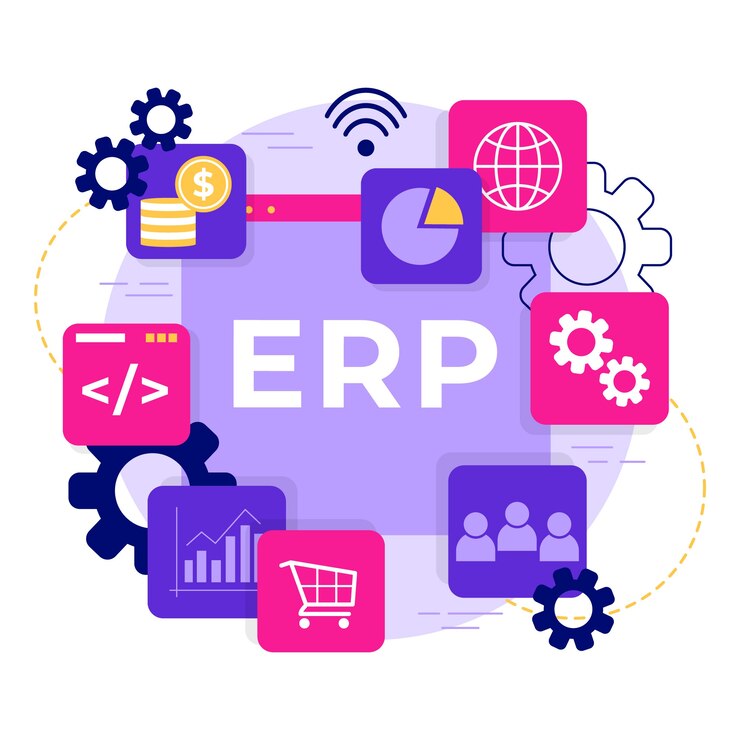Dubai’s Digital Transformation: How ERP Systems Are Reshaping Business Operations”
Introduction As Dubai accelerates its journey toward becoming the world’s smartest city, ERP systems in Dubai have emerged as critical tools for...

Introduction
As Dubai accelerates its journey toward becoming the world’s smartest city, ERP systems in Dubai have emerged as critical tools for business success. But what is an ERP system, and why has it become indispensable for companies operating in this dynamic emirate?
This comprehensive guide will explore:
- What is an ERP system and how it works
- The growing adoption of ERP systems in Dubai
- Key benefits for businesses in various sectors
- How to choose and implement the right ERP solution
Whether you’re a startup in DIFC or an established enterprise in JAFZA, understanding ERP technology is essential for staying competitive in Dubai’s fast-evolving market.
What is an ERP System?
Defining Enterprise Resource Planning
An ERP (Enterprise Resource Planning) system is an integrated software platform that:
- Consolidates business processes into a unified system
- Provides real-time data across departments
- Automates routine operations
- Enhances decision-making through analytics
Core Components of ERP Systems
Modern ERP solutions typically include modules for:
✔ Finance and accounting
✔ Human resources management
✔ Supply chain and inventory
✔ Customer relationship management (CRM)
✔ Business intelligence and reporting
Evolution of ERP Technology
From 1960s inventory control systems to today’s cloud-based AI-powered platforms, ERP systems have transformed how businesses operate globally.
Why ERP Systems in Dubai Are Becoming Essential
1. Alignment with Dubai’s Smart City Vision
Dubai’s ambitious digital transformation initiatives like:
- Smart Dubai 2025
- Paperless Government Strategy
- Blockchain Strategy
…all encourage businesses to adopt integrated ERP systems in Dubai for seamless operations.
2. Addressing Complex Business Ecosystems
Dubai’s unique business environment requires ERP solutions that can handle:
- Multi-company structures in free zones
- Diverse workforce with varying contract types
- Complex VAT and compliance requirements
3. Supporting Dubai’s Thriving Sectors
Industry-specific ERP benefits:
- Retail & E-commerce: Omnichannel inventory management
- Logistics: End-to-end shipment tracking
- Real Estate: Property and tenant management
- Healthcare: Patient records and billing systems
Key Features of Modern ERP Systems in Dubai
1. UAE-Specific Functionality
Essential capabilities for Dubai businesses include:
- Arabic/English bilingual interfaces
- VAT-compliant invoicing and reporting
- Integration with UAE banking systems
2. Cloud-Based Flexibility
Advantages of cloud ERP solutions:
- Remote accessibility from anywhere in Dubai
- Automatic regulatory updates
- Lower upfront costs than on-premise systems
3. Advanced Analytics & AI
Next-gen ERP features:
- Predictive analytics for demand forecasting
- AI-powered process automation
- Customizable dashboards for real-time insights
Implementing an ERP System in Dubai: Best Practices
1. Assessing Your Business Needs
Critical evaluation points:
- Current pain points in operations
- Required modules and features
- Scalability requirements
2. Choosing the Right Deployment Model
Comparison:
| Cloud ERP | On-Premise ERP |
|---|---|
| Lower upfront cost | Higher initial investment |
| Automatic updates | Full control over system |
| Remote access | Local server required |
3. Ensuring Smooth Adoption
Change management strategies:
- Comprehensive staff training programs
- Phased implementation approach
- Continuous support and optimization
Conclusion
Understanding what is an ERP system and implementing the right ERP system in Dubai can be transformative for your business. In a city that never stops innovating, ERP solutions provide the technological foundation for efficiency, compliance, and growth.
As Dubai continues to lead regional digital transformation, businesses that leverage advanced ERP systems will gain significant competitive advantages in operational excellence and customer satisfaction.
FAQs About ERP Systems in Dubai
1. What makes ERP systems in Dubai different from other regions?
Dubai-specific ERP systems include Arabic language support, VAT compliance features, and integration with local banking and government systems like WPS.
2. How long does ERP implementation typically take in Dubai?
Implementation timelines vary from 3-6 months for SMEs to 12-18 months for large enterprises, depending on complexity.
3. Can ERP systems handle multiple free zone company structures?
Yes, advanced ERP solutions can manage multiple legal entities with different compliance requirements across Dubai’s free zones.
4. What’s the average cost of ERP software in Dubai?
Costs range from AED 15,000/year for basic cloud solutions to AED 500,000+ for customized enterprise systems.
5. How do ERP systems help with Dubai’s VAT compliance?
Modern ERP solutions automatically calculate VAT, generate compliant invoices, and prepare accurate tax return filings.







